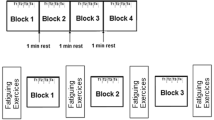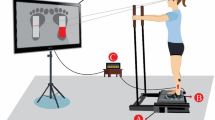Abstract
Muscular fatigue effects have been shown to be compensated by the implementation of adaptive compensatory neuromuscular strategies, resulting in modifications of the initial motion coordination. However, no studies have focused on the efficiency of the feedforward motor commands when muscular fatigue occurs for the first time during a particular movement. This study included 18 healthy subjects who had to perform arm-raising movements in a standing posture at a maximal velocity before and after a fatiguing procedure involving focal muscles. The arm-raising task implies the generation of predictive processes of control, namely Anticipatory Postural Adjustments (APAs), whose temporal and quantitative features have been shown to be dependent on the kinematics of the upcoming arm-raising movement. By altering significantly the kinematic profile of the focal movement with a fatiguing procedure, we sought to find out whether APAs scaled to the lower mechanical disturbance. APAs were measured using surface electromyography. Following the fatiguing procedure, acceleration peaks of the arm movement decreased by ~27 %. APAs scaled to this lower fatigue-related disturbance during the very first trial post-fatigue, suggesting that the Central Nervous System can predict unexperienced mechanical effects of muscle fatigue. It is suggested that these results are accounted for by prediction processes in which the central integration of the groups III and IV afferents leads to an update of the internal model by remapping the relationship between focal motor command magnitude and the actual mechanical output.





Similar content being viewed by others
References
Ahmed AA, Wolpert DM (2009) Transfer of dynamic learning across postures. J Neurophysiol 102:2816–2824. doi:10.1152/jn.00532.2009
Allen DG, Lamb GD, Westerblad H (2008) Skeletal muscle fatigue: cellular mechanisms. Physiol Rev 88:287–332. doi:10.1152/physrev.00015.2007
Amann M (2011) Central and peripheral fatigue: interaction during cycling exercise in humans. Med Sci Sports Exerc 43:2039–2045. doi:10.1249/MSS.0b013e31821f59ab
Amann M, Proctor LT, Sebranek JJ, Pegelow DF, Dempsey JA (2009) Opioid-mediated muscle afferents inhibit central motor drive and limit peripheral muscle fatigue development in humans. J Physiol 587:271–283. doi:10.1113/jphysiol.2008.163303
Aruin AS (2006) The effect of asymmetry of posture on anticipatory postural adjustments. Neurosci Lett 401:150–153. doi:10.1016/j.neulet.2006.03.007
Aruin AS, Latash ML (1995a) Directional specificity of postural muscles in feed-forward postural reactions during fast voluntary arm movements. Exp Brain Res 103:323–332
Aruin AS, Latash ML (1995b) The role of motor action in anticipatory postural adjustments studied with self-induced and externally triggered perturbations. Exp Brain Res 106:291–300
Benvenuti F, Stanhope SJ, Thomas SL, Panzer VP, Hallett M (1997) Flexibility of anticipatory postural adjustments revealed by self-paced and reaction-time arm movements. Brain Res 761:59–70
Bigland-Ritchie BR, Dawson NJ, Johansson RS, Lippold OCJ (1986) Reflex origin for the slowing of motoneurone firing rates in fatigue of human voluntary contractions. J Physiol 379:451–459
Bonnetblanc F, Martin O, Teasdale N (2004) Pointing to a target from an upright standing position: anticipatory postural adjustments are modulated by the size of the target in humans. Neurosci Lett 358:181–184. doi:10.1016/j.neulet.2004.01.020
Bouisset S, Do MC (2008) Posture, dynamic stability, and voluntary movement. Neurophysiol Clin 38:345–362. doi:10.1016/j.neucli.2008.10.001
Bouisset S, Zattara M (1981) A sequence of postural movements precedes voluntary movement. Neurosci Lett 22:263–270
Bouisset S, Richardson J, Zattara M (2000) Are amplitude and duration of anticipatory postural adjustments identically scaled to focal movement parameters in humans? Neurosci Lett 278:153–156
Carson RG, Riek S, Shahbazpour N (2002) Central and peripheral mediation of human force sensation following eccentric or concentric contractions. J Physiol 539:913–925. doi:10.1013/jphysiol.2001.013385
Chabeauti PY, Assaiante C, Vaugoyeau M (2012) Extreme short-term environmental constraints do not update internal models of action as assessed from motor imagery in adults. Neuroscience 222:69–74. doi:10.1016/j.neuroscience.2012.07.002
Christensen MS, Lundbye-Jensen J, Geertsen SS, Petersen TH, Paulson OB, Nielsen JB (2007) Premotor cortex modulates somatosensory cortex during voluntary movements without proprioceptive feedback. Nat Neurosci 10:417–419. doi:10.1038/nn1873
Cohn JV, DiZio P, Lackner JR (2000) Reaching during virtual rotation: context specific compensations for expected coriolis forces. J Neurophysiol 83:3230–3240
Corcos DM, Jiang H, Wilding J, Gottlieb GL (2002) Fatigue induced changes in phasic muscle activation patterns for fast elbow flexion movements. Exp Brain Res 142:1–12. doi:10.1007/s00221-001-0904-9
Cordo PJ, Nashner LM (1982) Properties of postural adjustments associated with rapid arm movements. J Neurophysiol 47:287–302
Côté JN, Mathieu PA, Levin MF (2002) Movement reorganization to compensate for fatigue during sawing. Exp Brain Res 146:394–398. doi:10.1007/s00221-002-1186-6
de Morree HL, Klein C, Marcora SM (2012) Perception of effort reflects central motor command during movement execution. Psychophysiology 49:1242–1253
de Wolf S, Slijper H, Latash ML (1998) Anticipatory postural adjustments during self-paced and reaction-time movements. Exp Brain Res 121:7–19
Desmurget M, Grafton S (2000) Forward modeling allows feedback control for fast reaching movements. Trends Cogn Sci 4:423–431
Enoka RM, Stuart DG (1992) Neurobiology of muscle fatigue. J Appl Physiol 72:1631–1648
Forestier N, Nougier V (1998) The effects of muscular fatigue on the coordination of a multijoint movement in human. Neurosci Lett 252:187–190
Fuglevand AJ, Zackowski KM, Huey KA, Enoka RM (1993) Impairment of neuromuscular propagation during human fatiguing contractions at submaximal forces. J Physiol 460:549–572
Gandevia SC (2001) Spinal and supraspinal factors in human muscle fatigue. Physiol Rev 81:1725–1789
Gandevia SC, Allen GM, Butler JE, Taylor JL (1996) Supraspinal factors in human muscle fatigue: evidence for suboptimal output from the motor cortex. J Physiol 490:529–536
Gandevia SC, Smith JL, Crawford M, Proske U, Taylor JL (2006) Motor commands contribute to human position sense. J Physiol 571:703–710. doi:10.1113/jphysiol.2005.103093
Garland SJ (1991) Role of small diameter afferents in reflex inhibition during human muscle fatigue. J Physiol 435:547–558
Hermens HJ, Freriks B, Merletti R, Stegeman D, Blok J, Rau G et al (1999) European recommendations for surface electromyography. Roessingh Research and Development
Horak FB, Nashner LM (1986) Central programming of postural movements: adaptation to altered support-surface configurations. J Neurophysiol 55:1369–1381
Huffenus AF, Amarantini D, Forestier N (2006) Effects of distal and proximal arm muscles fatigue on multi-joint movement organization. Exp Brain Res 170:438–447. doi:10.1007/s00221-005-0227-3
Ingram JN, Howard IS, Flanagan JR, Wolpert DM (2010) Multiple grasp-specific representations of tool dynamics mediate skillful manipulation. Curr Biol 20:618–623. doi:10.1016/j.cub.2010.01.054
Jaric S, Radovanovic S, Milanovic S, Ljubisavljevic M, Anastasijevic R (1997) A comparison of the effects of agonist and antagonist muscle fatigue on performance of rapid movements. Eur J Appl Physiol 76:41–47
Kanekar N, Santos MJ, Aruin AS (2008) Anticipatory postural control following fatigue of postural and focal muscles. Clin Neurophysiol 119:2304–2313. doi:10.1016/j.clinph.2008.06.015
Kawato M (1999) Internal models for motor control and trajectory planning. Curr Opin Neurobiol 9:718–727
Kennedy A, Guevel A, Sveistrup H (2012) Impact of ankle muscle fatigue and recovery on the anticipatory postural adjustments to externally initiated perturbations in dynamic postural control. Exp Brain Res 223:553–562. doi:10.1007/s00221-012-3282-6
Kurtzer I, Herter TM, Scott HS (2005) Random change in cortical load representation suggests distinct control of posture and movement. Nat Neurosci 8:498–504. doi:10.1038/nn1420
Lackner JR, Dizio P (1994) Rapid adaptation to coriolis force perturbations of arm trajectory. J Neurophysiol 72:299–313
Lafargue G, Paillard J, Lamarre Y, Sirigu A (2003) Production and perception of grip force without proprioception: is there a sense of effort in deafferented subjects. Eur J Neurosci 17:2741–2749. doi:10.1046/j.1460-9568.2003.02700.x
Lee WA, Buchanan TS, Rogers MW (1987) Effects of arm acceleration and behavioral conditions on the organization of postural adjustments during arm flexion. Exp Brain Res 66:257–270
Li X, Aruin AS (2007) The effect of short-term changes in the body mass on anticipatory postural adjustments. Exp Brain Res 181:333–346. doi:10.1007/s00221-007-0931-2
Liu JZ, Shan ZY, Zhang LD, Sahgal V, Brown RW, Yue GH (2003) Human brain activation during sustained and intermittent submaximal fatigue muscle contractions: an FMRI study. J Neurophysiol 90:300–312. doi:10.1152/jn.00821.2002
Massion J (1992) Movement, posture and equilibrium: interaction and coordination. Prog Neurobiol 38:35–56
Massion J, Alexandrov A, Frolov A (2004) Why and how are posture and movement coordinated? In: Mori S, Stuart DG (eds.) Progress in brain research: brain mechanisms for the integration of posture and movement, Elsevier, Amsterdam, pp 13–27. doi:10.1016/s0079-6123(03)43002-1
McCloskey DI, Ebeling P, Goodwin GM (1974) Estimation of weights and tensions and apparent involvement of a “sense of effort”. Exp Neurol 42:220–232
Miall RC, Wolpert DM (1996) Forward models for physiological motor control. Neural Networks 9:1265–1279
Missenard O, Mottet D, Perrey S (2009) Adaptation of motor behavior to preserve task success in the presence of muscle fatigue. Neuroscience 161:773–786. doi:10.1016/j.neuroscience.2009.03.062
Mochizuki G, Ivanova TD, Garland SJ (2004) Postural muscle activity during bilateral and unilateral arm movements at different speeds. Exp Brain Res 155:352–361. doi:10.1007/s00221-003-1732-x
Morris SL, Allison GT (2006) Effects of abdominal muscle fatigue on anticipatory postural adjustments associated with arm raising. Gait Posture 24:342–348. doi:10.1016/j.gaitpost.2005.10.011
Papaxanthis C, Pozzo T, McIntyre J (2005) Kinematic and dynamic processes for the control of pointing movements in humans revealed by short-term exposure to microgravity. Neuroscience 135:371–383. doi:10.1016/j.neuroscience.2005.06.063
Saradjian AH, Tremblay L, Perrier J, Blouin J, Mouchnino L (2013) Cortical facilitation of proprioceptive inputs related to gravitational balance constraints during step preparation. J Neurophysiol 110:397–407. doi:10.1152/jn.00905.2012
Schmid M, Schieppati M, Pozzo T (2006) Effect of fatigue on the precision of a whole-body pointing task. Neuroscience 139:909–920. doi:10.1016/j.neuroscience.2005.12.060
Shadmehr R, Mussa-Ivaldi FA (1994) Adaptive representation of dynamics during learning of a motor task. J Neurosci 14:3208–3224
Sinoway LI, Hill JM, Pickar JG, Kaufman MP (1993) Effects of contraction and lactic acid on the discharge of group III muscle afferents in cats. J Neurophysiol 69:1053–1059
Slijper H, Latash ML, Mordkoff JT (2002) Anticipatory postural adjustments under simple and choice reaction time conditions. Brain Res 924:184–197
Strang AJ, Berg WP (2007) Fatigue-induced adaptive changes of anticipatory postural adjustments. Exp Brain Res 178:49–61. doi:10.1007/s00221-006-0710-5
Strang AJ, Berg WP, Hieronymus M (2009) Fatigue-induced early onset of anticipatory postural adjustments in non-fatigued muscles: support for a centrally mediated adaptation. Exp Brain Res 197:245–254. doi:10.1007/s00221-009-1908-0
Takahashi CD, Nemet D, Rose-Gottron CM, Larson JK, Cooper DM, Reinkensmeyer DJ (2006) Effect of muscle fatigue on internal model formation and retention during reaching with the arm. J Appl Physiol 100:695–706. doi:10.1152/japplphysiol.00140.2005
Taylor JL, Gandevia SC (2008) A comparison of central aspects of fatigue in submaximal and maximal voluntary contractions. J Appl Physiol 104:542–550. doi:10.1152/japplphysiol.01053.2007
Taylor JL, Butler JE, Allen GM, Gandevia SC (1996) Changes in motor cortical excitability during human muscle fatigue. J Physiol 490:519–528
Taylor JL, Petersen N, Butler JE, Gandevia SC (2000) Ischaemia after exercise does not reduce responses of human motoneurones to cortical or corticospinal tract stimulation. J Physiol 525:793–801
Vuillerme N, Nougier V, Teasdale N (2002) Effects of lower limbs muscular fatigue on anticipatory postural adjustments during arm motions in humans. J Sport Med Phys Fit 42:289–294
Walsh LD, Gandevia SC, Taylor JL (2010) Illusory movements of a phantom hand grade with the duration and magnitude of motor commands. J Physiol 588:1269–1280. doi:10.1113/jphysiol.2009.183038
Wolpert DM, Ghahramani Z (2000) Computational principles of movement neuroscience. Nat Neurosci 3:1212–1217
Wolpert DM, Kawato M (1998) Multiple paired forward and inverse models for motor control. Neural Netw 11:1317–1329
Wolpert DM, Ghahramani Z, Jordan MI (1995) An internal model for sensorimotor integration. Science 269:1880–1882
Acknowledgments
The authors wish to thank Dr. Grant Handrigan for his help in ironing out last-minute English language problems and Dr. Romain Terrier for his comments and advice. We also thank all the subjects for their cooperation.
Conflict of interest
The authors declare that they have no conflict of interest.
Author information
Authors and Affiliations
Corresponding author
Rights and permissions
About this article
Cite this article
Monjo, F., Forestier, N. Unexperienced mechanical effects of muscular fatigue can be predicted by the Central Nervous System as revealed by anticipatory postural adjustments. Exp Brain Res 232, 2931–2943 (2014). https://doi.org/10.1007/s00221-014-3975-0
Received:
Accepted:
Published:
Issue Date:
DOI: https://doi.org/10.1007/s00221-014-3975-0




